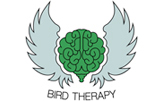 The story of Joe Harkness is a truly remarkable one. In his own words, he is "working class with a chequered past and no university education". A deeply personal and open approach means that, even before Joe's book "Bird Therapy" reaches the shelves, he has touched many people's lives already, through his words and shared experiences. Here Joe describes the growing movement that is recognising the power of nature to heal the mind and maintain wellbeing:
The story of Joe Harkness is a truly remarkable one. In his own words, he is "working class with a chequered past and no university education". A deeply personal and open approach means that, even before Joe's book "Bird Therapy" reaches the shelves, he has touched many people's lives already, through his words and shared experiences. Here Joe describes the growing movement that is recognising the power of nature to heal the mind and maintain wellbeing:
I recently did a couple of talks at Pensthorpe bird and wildlife fair. After one of the talks, someone came up to me and asked if they could tell me something, to which I obliged, as sharing and connecting is one of the things that is based upon. They went on to tell me how they’d planned out their suicide at a local nature reserve and as they walked to the area where they’d chosen to do it, a Hen Harrier flew straight across their path, it’s ethereal wonder reminded them that life is worth living. That’s the power of birds – of nature.
I couldn’t stop thinking of this comment and the hundreds, possibly thousands, of other stories that people have shared with me since I started writing about my own mental health and my discovery of birdwatching. It would appear that all it takes is for one person to share their story openly, then others will follow suit and again, that’s such a powerful thing to be part of. I’ll always remember a comment that was left in the survey that accompanied the book; ‘when I was in prison, the sound of the birds outside my cell window kept me going’ and the countless people who had suffered bereavement but found solace in the companionship of garden birds – especially Blackbirds and Robins.
Nature hasn’t cured me, it can’t, but it has certainly helped me to heal. Many people describe it as a balm or a salve and I suppose that’s a good way of relating it. To me it’s a constant and consistent presence that I can fall into and escape whenever I need to. I use the same line all the time, but in the case of birds, I truly feel that they are consistent in a way that people rarely are. Take your garden bird community for example. Their characters and nuances become a part of our day, their lives intertwine with our own, but no matter how bad things get for us, their lives go on. Birds herald the seasons, with their marvellous migratory cycles and familiar melodies. They can usher in changes in the weather, like the Hirundines flying lower as rain approaches or the Mistle Thrush singing forth a storm.

Nature and birdwatching can also help us to discover purpose. Perhaps through keeping records, surveying and sharing – feeding into a wider web of people who share the same interest. We can connect ourselves with place, maybe through the finding of and observing of a local patch. A local patch can become our haven and we’ll invariably share it with a wealth of wildlife, avian and beyond. This wildlife will change with the seasons, the weather and with human interference, but will always be there, and we can get to know it in a similar way to that in which we get to know our garden bird community. These consistent calendars we can find within nature can also help us to find ourselves, as we become more aware of our own roles in the wider world.
More people than ever are taking notice of the benefits of being outdoors. The entire work of Miles Richardson, a researcher from Derby University, is focused on nature connectedness and there are also some wonderful books out there, such as Emma Mitchell’s beautiful Wild Remedy. I was lucky enough to converse with Chris Packham during January’s run of Winterwatch and we discussed suicide and Bird Therapy openly on primetime TV. That shows just how much of a real thing the movement is becoming.
I have no doubt that one day in the near future, doctors will prescribe birdwatching to people struggling with mild to moderate mental health conditions. It’s a wonderful idea and one that can work if thought out properly. In our darkest times, being told to ‘go out and watch some birds’ simply isn’t going to work. We must collaborate to ensure that there are working models of bird feeding, walks, identification and observation that marry arts and nature, along with the worlds of therapy and education.
 I’ve written extensively on the benefits of birdwatching for mental health and wellbeing and shared my personal journey in my book Bird Therapy which is published on 13th June 2019, by Unbound. It can be preordered from most booksellers.
I’ve written extensively on the benefits of birdwatching for mental health and wellbeing and shared my personal journey in my book Bird Therapy which is published on 13th June 2019, by Unbound. It can be preordered from most booksellers.
Pre-order Joe's book "Bird Therapy" on Amazon
Blog: https://birdtherapy.blog/
Follow Bird Therapy aka Joe Harkness on Twitter: @BirdTherapy













